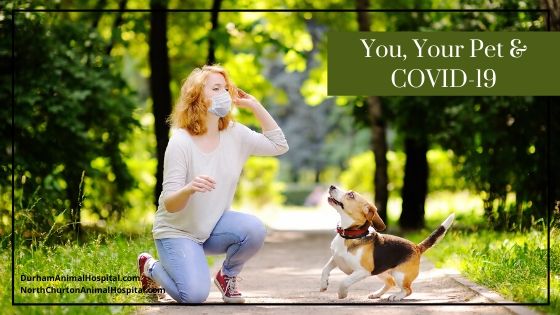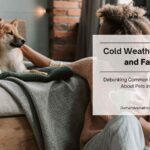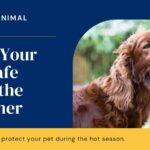You, Your Pet and COVID-19 – When the coronavirus began sweeping the nation, devoted pet owners began questioning if it might affect pets and our interactions with them.
Your relationship with a pet can be very comforting, especially now when many of us choose to remain close to home. The benefits of having a pet greatly outweigh the potential of becoming ill from your pet or of spreading illness to them, by following simple precautionary measures.
Can pets be infected by their owners or vice versa?
Although the news has reported a few isolated cases of animals testing positive for COVID-19, the implication that a pet could get COVID-19 from a person is very low, and the risk of a person getting it from an animal is even lower.
Coronaviruses occur in virtually every animal, including humans. Even though coronaviruses in dogs, cats, pigs, and cattle are common, they do not cause illness in people. The coronaviruses tend to be species-specific and cross-species transmission is rare, but any potential diseases can be avoided by following basic hygiene practices when handling a pet.
COVID-19 recommendations for interacting with your pets according to the CDC:
1. If possible, do not allow pets to interact with people or other animals outside the household and keep cats indoors.
2. Walk dogs on a leash and stay at least 6 feet from other people or animals.
3. Avoid parks or public places where a large number of people and dogs gather.
4. If you suspect you have or tested positive for COVID-19, restrict contact with your pet. If you have no one else to care for a pet while you are sick, wear a face mask when around them, and wash your hands before and after interacting with them.
Practice good “common sense” hygiene every day.
Always wash hands!!
1. After touching, playing with, and feeding your pet and handling pet food.
2. After cleaning up after pets and handling pet bedding, cages, toys, dishes, tanks, etc.
3. Before preparing food or drinks and before eating.
4. After removing clothes that are soiled by your pet.
Using soap and water is always best, but if unavailable, use hand sanitizer until you’re able to wash your hands.
Practice good pet hygiene.
Pet germs can contaminate surfaces even when pets don’t touch them directly.
1. Disinfect pet bedding, cages, toys, etc. outdoors if possible.
2. Don’t clean supplies such as food and water bowls in the kitchen sink or food prep area.
3. Remove dog poop from your yard or public places by using a bag and disposing of it in proper containers/areas.
4. Clean your cat’s litter box daily to minimize the risk of being exposed to harmful parasites.
You, Your Pet and COVID-19 – By keeping yourself and your pet healthy, potential diseases and illnesses can be avoided.
If you suspect your pet is sick or have questions about your pet’s health, contact your veterinarian.
Dr. James Miller, Dr. Katie Leslie, and their staff at Durham and North Churton Animal Hospitals are available to address your concerns and answer any questions.
In the Durham or Hillsborough, NC areas:
Visit https://durhamanimalhospital.com/ for more information or call 919-620-7387.
Visit https://northchurtonanimalhospital.com/ for more information or call 919-644-7387.






